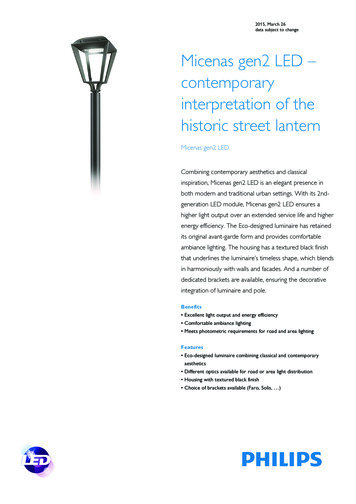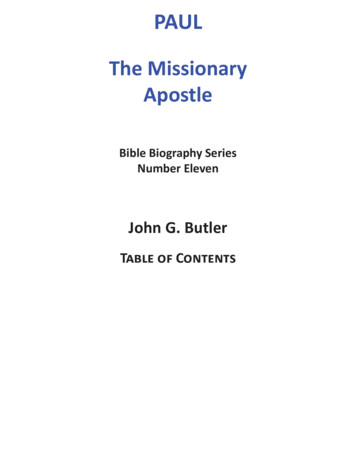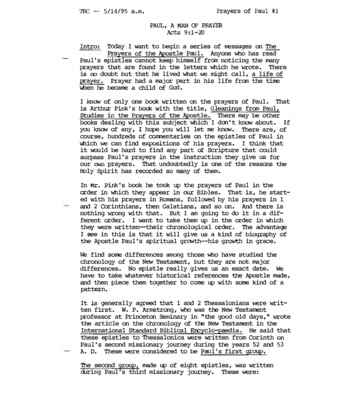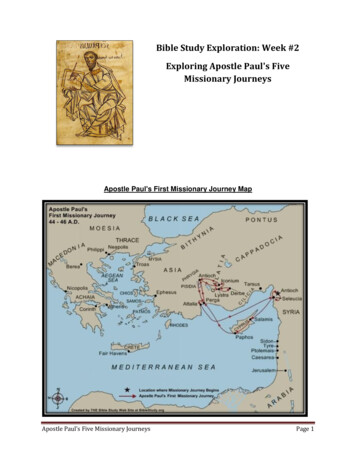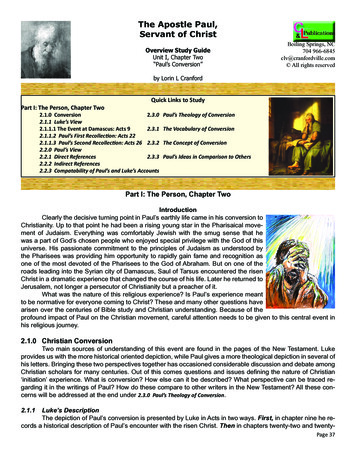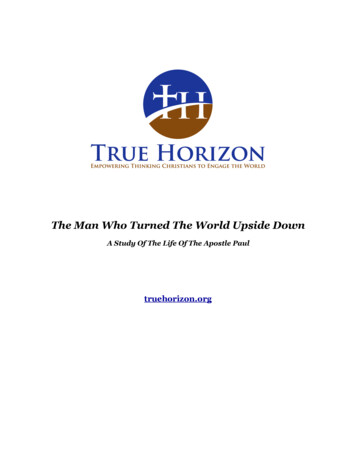
Transcription
The Man Who Turned The World Upside DownA Study Of The Life Of The Apostle Paultruehorizon.org
The Man Who Turned The World Upside DownCourse ObjectivesThe purpose of this course is to provide an in-depth look at the life of the Apostle Paul so that thestudent will be able to approach his writings and teachings in the proper context. UnderstandingPaul’s background, outlook, and the circumstances from which he penned the New Testamentletters, will greatly enhance the student’s ability to interpret those letters. Upon completion ofthis study the student should be familiar with, and able to articulate and understanding of: Paul’s upbringing and training, both in Tarsus and Jerusalem, and the ways in which eachprepared him for his life mission.The significance and objective nature of Paul’s conversion experience on the road toDamascus.The specific apologetic tactics Paul used on his evangelical missions when entering a newcity and encountering the Judaizing and/or Gentile elements of that region.The importance of Paul’s disagreement with Peter and the significance of the JerusalemCouncil.The important issues that were addressed on each of his missionary journeys, with specialemphasis on Corinth and Ephesus.The powerful and effective apologetic outline demonstrated by Paul in Athens on Mars Hill.Paul’s trials in Jerusalem and ultimate journey to Rome.The major themes of Paul’s writings.A major “Takeaway Point” for each lesson and how it applies to the contemporary church.SourcesLongenecker, R., The Ministry and Message of Paul, (Grand Rapids, MI: Zondervan, 1971)Pollock, John, The Apostle: A Life of Paul, (Colorado Springs, Colorado: Chariot Victor Publishing, 1985)Swindoll, Charles, Paul: A Man of Grace and Grit, (Nashville, Tennessee: W Publishing Group, 2002)Wangerin, Walter, Paul: A Novel, (Grand Rapids, Michigan: Zondervan, 2000)Wood, C. T., The Life, Letters, and Religion of St. Paul, (Edinburgh, Scotland: T & T Clark, 1932)Wright, N. T., The Resurrection of the Son of God, (Minneapolis, Minnesota: Fortress Press, 2003)The Story of Paul the ApostleDVD link: http://www.amazon.com/gp/product/B0000DHFZT/ref olp product details?ie UTF8&me ASIN: B0000DHFZT2
The Man Who Turned The World Upside DownCourse Outline1. Early lifea. Family and upbringingb. Education in Tarsus and under Gamaliel in Jerusalemc. As rabbi and counselor to the Sanhedrin2. The stoning of Stephena. The apparent impact of this event on Saulb. Saul’s mission to eradicate the heresy of “The Way.”3. Saul’s conversiona. It’s objective natureb. Interpreting differing accounts4. Damascus and aftera. Saul’s time of silence and solitude in Arabiab. The return to Tarsus and the “lost” years5. The First Missionary Journeya. Issues with Barnabas and John Markb. Tactics in encountering the culture6. Confrontation in Jerusalema. Issues with Peterb. The letter to Gentile believersc. Paul’s understanding of Mosaic Law7. The Second Missionary Journeya. The Philippian Churchb. The Thessalonican Church8. Paul in Athensa. The setting and audience for his speech on Mars Hillb. His apologetic tacticsi. Encounter the cultureii.Expose the cultureiii. Evangelize the culturec. On to Corinth9. The Third Missionary Journeya. Emphasis on Ephesusb. Political issues surrounding his departure from Ephesus10. Return to Jerusalema. Before the Sanhedrinb. Trial before Felixc. Trial before Festusd. Imprisonment in Caesarea11. Paul’s final Journeya. Shipwreck and the voyage to Romeb. Letters from Romec. Educated assessment of Paul’s final days12. Lessons from Paula. Legalismb. Libertinismc. Christologyd. Perseverancee. Vocation –vs- Avocation3
The Man Who Turned The World Upside DownLesson 1: Saul’s Early Life Show Video: Intro and 6:20 – 8:20 Born: (somewhere between 1 BC and 1 AD) in Tarsus, Cilicia 12 miles from the Mediterranean Sea :: 25 miles south of the Taurus Mountains Cilician Gate – chiseled (wide enough for a wagon) by Tarsian engineers to allow access toRoman road system to the north toward Greece and Rome Pompey made Cilicia a separate Roman province, but in 25 BC, the Imperial governmentjoined it with SyriaParents (Acts 23:6, Romans 4:1, 9:3, 11:1, 2 Corinthians 11:22, Philippians 3:5-6, 2 Timothy1:3) Father: Most likely a master tentmakero Must have been wealthy citizen (or burgess) of TarsusReform had removed rank of citizen from all householdso Worked in leather and cilicium Cloth woven from the hair of large, long-haired black goats To this day they graze on the slopes of the Taurus Mountainso Black tents of Tarsus were used by caravans, nomads and armies all over Asia Minorand Syria Mother is never mentionedo Died in infancy? Alienated? Simply no reason to mention her (culturallyunimportant)? At least one sister (see: Acts 23:16) Would have referred to those outside their faith and blood as “Gentiles” (‘Nations,’ ‘Greeks’)(Pollock, 15)“Citizen of Rome” Civis Romanus: This title was an important one – became very important later in his lifeo Seldom granted to anyone except for services rendered to Rome or for offering bigbuckso Perhaps his grandfather had aided Pompey or Cicero when Rome first governedCiliciao Father paid money?o Gave local distinction and hereditary privileges that could be claimed anywhere inthe Roman empireName As a citizen, would have had a full Latin name (threefold, as in: Gaius Julius Caesar) First two names conferred family heritageo These were lost because his story was first written by a Greek colleague (Luke) whowould not have understood Latin names! Third name (personal cognomen) was Paullus4
The Man Who Turned The World Upside Down Also given a Jewish name at circumcision when he was 8 days old – Saulo Romans 11:1 “I am an Israelite myself, a descendant of Abraham, from the tribe ofBenjamin.”o Meaning – either “asked for” or in honor of the most famous Benjamite inhistory – King Saul (King David’s predecessor)Tarsus (Pollock, 14-15) Columns of pagan temples dominated the marketplace Considered one of the most important seats of learning in Near Easto Athenian, Roman, Babylonian, and Ninevite influences there that he had to have beenfamiliar witho Would have exposed to and become familiar with Hellenic/Oriental world, but not toofamiliar His parents were fervent Jewish nationalists and strict obeyers of he Torah: Phariseeso Would have fought to guard their son against contamination Tarsus had its own University (Pollock, 17)o Athenodorus – the tutor and confidant of Emperor Augustus – and Nestor Both were the most distinguished pagan citizenso Strabo (historian writing in 19 AD) says it was, in his day, “the chief seat of learningin the world.” (Wood, 3)o But a strict Pharissee would not allow his son to get into pagan moral philosophyEducation (Pollock, ch. 1) Friendship with Gentile children was discouraged. Greek ideas were despised, but notunknown Could speak Greek from infancy and was familiar with Greek literature (see: Acts 17)o Acts 17:28 and Titus 1:12 – both quotes of Greek philosopher Epimenideso 1 Corinthians 15:33 – a line of iambic poetry from Greek comedian, Menander Working knowledge of Latin At home his family would have spoken Aramaic (the language of Judea, and a form ofHebrew)o His speech to the mob in Jerusalem in Acts 22:2 is in Aramaic Looked to Jerusalem like Islam looks to Meccao They were the people of the promise to whom God had revealed His glory and Plan. School in the Tarsus synagogue taught nothing but Hebrew texts and sacred lawo Each boy repeated phrases in chorus after the synagogue keeper (hazzan) until everyvowel, accent, and rhythm were precisely correct.o Learned to write Hebrew characters on papyrus, rolled them into scrollso Later would have received a roll on vellum (fine lamb, kid, or calf skin used forwriting): The Greek translation of the OT – The Septuagint By age 13 he would have mastered Jewish history, the poetry of the psalms and the majesticliterature of the prophets. He knew every pitch change and knew it all accurately. Now hewas ready for higher education.5
The Man Who Turned The World Upside Down Age 14 sent by sea to Palestine to climb the walls of JerusalemTutored under Gamaliel in Jerusalemo Two schools in Jerusalem, both Pharisaic (Wood, 6-7)o School of Shammai – rested all on Scripture Talmud states that the “irritability of Shammai sought to drive us from theworld.”o School of Hillel – upheld tradition as more binding than the law and was moreinfluentialo Gamaliel was Hillel’s grandson More tolerant version of Judaism Where more strict Palestinian Jews would not even use the Greek language torecite their prayers etc, Gamaliel “taught a thousand boys, of whom halfstudied the Law, and half the ‘wisdom of the Greeks.” (Wood, 5) Remained under Gamaliel for 5-6 yearso Taught to argue his case in a question and answer style debate known as the diatribeAs a rabbi he would be part preacher, part lawyer, who learned to prosecute and defend thosewho broke the sacred law – tôrâ.o Ultimately, Saul would have aspired to a seat as a “ruler of the Jews” on theSanhedrin The Jewish nation was a theocracy, led by the Sanhedrin – supreme in allreligious decisions This is the most the Roman government would allow Religious and national leaders were identical 71 members – some drawn from hereditary priesthood, others lawyers andrabbis Each member served equally as judge, senator and spiritual master Return to Tarsuso Jew bred to a trade No rabbi took fees but rather supported himselfo Saul must have left Jerusalem in his early 20s Seems logical that if he had remained in Jerusalem during the time of Jesusministry, he would have mentioned that fact and arguing against him Never mentions being an eyewitness Back to Jerusalemo Probably returned in his early 30so Don’t know exactly why he was there but most likely because he was serving as alocal rabbi or member of the Sanhedrin Married with children? (Wood, 11)o Parenthood was a later qualification required of candidates for the Sanhedrin, yet henever mentions a wife6
The Man Who Turned The World Upside Downoo No proof that this regulation was in force this earlyAlso true that most Jews regarded marriage by age 18 as duty Some have suggested this was his reference in 1 Corinthians 9:5Maimonides did write that celibacy after age 20 was acceptable for those who wishedto devote himself to study of the Law This would match his comments in 1 Corinthians 7 (especially vs.8)Physical Characteristicso Shorto Bald(ing)o Black beard – Jews despised the Roman habit of shavingo Exuded an aura of confidence (arrogance?)o Bow-leggedo Some kind of physical ailment – “Thorn in the flesh” (2 Corinthians 12:7) Both painful and humiliating (Galatians 4:13-15) Malaria Back problems Epilepsy (see: Galatians 4:14, scorn “spit out”)o Men would spit in the presence of an epileptic in a fit to keep themselvesfrom taking on the evilDiscusssion Questions How did Saul’s childhood in Tarsus help to shape him for later service? Would it havebenefited him more to have been born and raised in Jerusalem?Does the fact that Saul does not seem to have first hand knowledge/experience withJesus’ teaching help or hurt his credibility in preaching the Gospel? Why or why not?Explain the impact of Saul’s being trained under Gamaliel in the School of Hillel.Which aspect of Saul’s early life strikes you as the most significant in forming hischaracter and personality?Take Away PointSee Saul’s upbringing and background as an inspiration to view our own lives as beingprimarily centered on God’s call to a holy life.7
The Man Who Turned The World Upside DownLesson 2: The Stoning of Stephen Show Video: 2:37 – 6:08 Sadducee The politically powerful sect of the Jewish leadership Disappeared in 70 A.D. with the fall of Jerusalem Did not believe in resurrection of any kind or in a personal Messiah Denied that oral law was binding or authoritative Interpreted Mosaic Law more literally than the Pharisees Attributed all to free will – God did not make things happen Rejected the idea of a spiritual world – angels and demons Only the books of Moses were canonicalPharisee Accepted oral tradition as well as the Mosaic Law Accepted both free will and the sovereignty of God as canceling each other out (?) Had a very complicated view of a hierarchy of angels and demons There was a future for the dead, immortality for the soul, and reward/punishment after deathEssene A sect that separated from the Pharisees because the Pharisees did not follow strict enough observance of thepurity laws of the Torah Many believe that this was the sect of which John the Baptist was a member Communal ownership of property Marriage not condemned but was avoided Attributed all that happened to fateZealot Only around between 6 B.C. (Herod the Great) and when the final remnant died at Masada in 73 A.D. Bore allegiance only to God – refused to pay taxes to a pagan emperor Held fiercely to Jewish tradition Opposed to the use of the Greek language in Palestine Prophesied a coming time of salvationSanhedrin condemns Christ to death – thinks the “uprising” has been dealt withConspiracy in Matthew 28:11-15 is an admission that the tomb was empty!After the Resurrection and Pentecost the “priests, and the captain of the temple guard and theSadducees were greatly disturbed because the Apostles were teaching the people andproclaiming in Jesus the resurrection of the dead.” (Acts 4:1-4) Head of the Sanhedrin (Supreme Court) was a SadduceeRead: Deuteronomy 21:22-23 The idea that Jesus was Messiah was repulsive to the Jewish leadership! He was a cursed, common criminal Apostles had been jailed for their blasphemous speaking but had escaped miraculously (Acts5:17-24) only to be discovered back at it again (Acts 5:25). The full body of the Sanhedrinbrought them to be questioned by the high priest Read Acts 5:27-33o Saul was either a member of the Sanhedrin or a lawyer/advisor to it8
The Man Who Turned The World Upside Downo He therefore heard this speech by Peter/ApostlesRead Acts 5:34-42o Recognize anyone?o Restraint and tolerance – the wisdom of Paul’s mentorSaul pursued Stephen vindictively; stirring enmity, dissension, and jealousy while insulting andderiding Jesus. Stephen did not retaliate.Stephen (Pollock, 20-23) About the same age as Saul – with the “face of an angel” (Acts 6:15) Chosen as a leader of the seven men (Acts 6:3) to minister to the church in Jerusalemo Contrary to Saul, spent much of his time in service to widows – food and necessitieso Traditionalist party of the Christian church tended toward exclusion from the Greekspeaking “Hellenists” (Wood, 14)o Progressive party was more inclusive Greek was OK to speako Significant that the charge brought against Stephen was that he aimed to “change thecustoms which Moses delivered to us.” (Acts 6:14) As well educated and as powerful a thinker as Saulo Spoke Greek and Aramaic for sureo Saul would have seen his social concerns as a waste of academic talento Saul jealous (?) that people loved and respected him (where they feared Paul) Recounted (Acts 7:1-53) Jewish history and how it pointed to the Messiaho In the minds of the Sanhedrin, Stephen spoke against the Temple! Note Stephen’s proclamation in verse 7:48: “the Most High does not live inhouses made by men ” (reference to Isaiah 66:1-2)o This must have greatly impacted Paul See his speech before the leaders of Athens in Acts 17:24 Read Acts 7:54-8:1o Paul was involved, and probably oversaw, the stoning of Stephen (7:58-8:1)Stoning Taken to a cliff (“Rock of Execution”) with a drop at least the height of two men (Wangerin,Pollock, 13) Stripped and pushed off to fall on rocks below and break his necko At a minimum, this would stun him so that the death was not too “unmerciful” Leader of the stoning (Saul?) would drop a large boulder onto the chest to crush ribs andincapacitate Crowd would then hurl stones of all sizes Aim is to obliterate the victim as a way of deterrence for others who may by sympathetic9
The Man Who Turned The World Upside DownAfter this event, and throughout the following winter, the Jewish authorities embarked onsystematic suppression of “The Way” with Saul as the chief agent of that suppression. (Wood,19) He was “a blasphemer, and a persecutor, and a violent aggressor” (1 Timothy 1:12-13) He “laid waste” to the Church at Jerusalem, entering private houses and hauling men andwomen off to prison (Acts 8:3) He had them flogged (Acts 22:19) in his effort to make them blaspheme the name of Jesus(Acts 26:11, 1 Corinthians 15:9, Galatians 1:13) When he ran out of victims in Judea, he was still “breathing out murderous threats against thedisciples (Acts 9:1) Went to the High Priest and begged to be sent to Damascus (Acts 9:2) to continue his worko The heretical “Way” had been known to have moved north to spread its poisonousmessage and Saul’s aim was to stop it.Paul set out to Damascus to lead the persecution there. He was a terrorist on a mission Discusssion Questions Discuss the different Jewish sects and the conflict that Jesus’ resurrection was causingamong them. How did Saul’s being a Pharisee from the School of Hillel play into hisview of the situation?What is your view of the role Gamaliel played in the events described? How do you seeSaul’s training under him conflicting with his actions that fell more in line with theShammai school of Pharisees?Try to see the events described from Paul’s point of view. Describe how Saul may haveviewed Stephen’s actions as they related to upholding Jewish tradition. Knowing hisbackground, is Saul’s reaction understandable? What is his motivation?Stephen knew, while giving his speech, the repercussions it might bring. Saul was mostlikely listening. What impact do you think Stephen’s speech had on Saul, if any?How does Saul’s leadership in the persecution of The Way become significant? Why washe on his way to Damascus? What was his mindset as he set out on the trip?Take Away PointWe live in ignorant bliss about the reality of the church’s global suffering. Stephen’scourage and dedication to the Truth should serve to inspire us toward a similar witness.We have no idea how are actions may inspire those around us as Stephen seemed toforever impact Saul.10
The Man Who Turned The World Upside DownLesson 3: Saul’s Conversion Show Video: 00:39 – 2:40 and 8:21 – 10:38 Why was Saul on his way to Damascus? Why Damascus?o About 150 miles northeast of Jerusalem – 4 to 6 days travel on footo The nearest important city outside the Holy Lando Trade hub so likely the “virus” might spread rapidly from there What was happening to the church?o The law of unintended consequences the scattering of the churcho Same old story God’s ways may not make sense to us before we know theoutcomeWhat actually happened to Saul on the road to Damascus? (Wright, Ch. 8) Saul was not “changing religions”o He believed he was receiving a fuller revelation about the religion to which healready held His experience was objectiveo Many modern “spiritualists” claim that Saul’s experience was simply an internal,subjective one that “worked for him”o A first-century Jew would not have seen it that wayo The “heavens” meant the air around you the environment in which you livedPaul’s Own AccountsGalatians 1:11-17I want you to know, brothers, that the gospel I preached is not something that man made up. 12I did not receive itfrom any man, nor was I taught it; rather, I received it by revelation from Jesus Christ.13For you have heard of my previous way of life in Judaism, how intensely I persecuted the church of God andtried to destroy it. 14I was advancing in Judaism beyond many Jews of my own age and was extremely zealous forthe traditions of my fathers. 15But when God, who set me apart from birth and called me by his grace, was pleased16to reveal his Son in me so that I might preach him among the Gentiles, I did not consult any man, 17nor did I goup to Jerusalem to see those who were apostles before I was, but I went immediately into Arabia and later returnedto Damascus. “revelation” in verse 12 is the Greek word apokalypsis: “an unveiling of the truth itself”from Jesus himself. This was not a second hand story he got from Peter, James and JohnReferred to Jesus as “Messiah”The description (vs. 15) is reminiscent of the call of the prophetso See: Isaiah 49:1, Jeremiah 1:5 – both called “from the womb”“ his Son in me ” (vs. 16) – has been used to claim this was only Saul’s internal,subjective experience.o The Greek word here is en: “in or through”11
The Man Who Turned The World Upside DownoBut context dictates this should be taken as through where Saul’s life would bea reflection of the life of Jesus.1 Corinthians 9:1Am I not free? Am I not an apostle? Have I not seen Jesus our Lord? Are you not the result of my work in theLord? Here the Greek word heoraka: “I have seen,” is always used for ordinary sight –something visual, not something private “vision.”1 Corinthians 15:8-11and last of all he appeared to me also, as to one abnormally born. Here the Greek word ophthe: “he appeared,” can be used as either a public or private“appearance.”o Proximity to 1 Corinthians 9:1 (above) suggests he was using it in the same wayo “ last of all ” makes his seeing the last part of a sequence that came to an endo It is not part of some ongoing set of spiritual experiencesThe context of the entire 15th chapter of 1 Corinthians is with regard to a bodilyresurrectiono Not information that was passed on from someone elseo Lists witnesses “who are still living” and can be interrogatedThis is not a description of something that was just going on in Saul’s head!There are other references Acts 9:17 – AnaniasActs 9:27 – BarnabasLuke 24:39 – “flesh and bones”Acts 26:16 – same verb as 1Cor 15 but you get the gist Luke’s Descriptions (Wright, 388-398)Acts 9:3-9As he neared Damascus on his journey, suddenly a light from heaven flashed around him. 4He fell to the groundand heard a voice say to him, "Saul, Saul, why do you persecute me?"5"Who are you, Lord?" Saul asked. "I am Jesus, whom you are persecuting," he replied. 6"Now get up and gointo the city, and you will be told what you must do."7The men traveling with Saul stood there speechless; they heard the sound but did not see anyone. 8Saul got upfrom the ground, but when he opened his eyes he could see nothing. So they led him by the hand into Damascus.9For three days he was blind, and did not eat or drink anything. This is Luke telling the story to his own readerso Luke was not thereo In the accounts that follow (below), Luke is enabling the reader to listen in as Paultells the account to two different audiences12
The Man Who Turned The World Upside Down An introduction to Saul/Paul to explain how he was transformed from persecutor topreacherActs 22:6-11"About noon as I came near Damascus, suddenly a bright light from heaven flashed around me. 7I fell to theground and heard a voice say to me, 'Saul! Saul! Why do you persecute me?'8" 'Who are you, Lord?' I asked." 'I am Jesus of Nazareth, whom you are persecuting,' he replied. 9My companions saw the light, but they did notunderstand the voice of him who was speaking to me.10" 'What shall I do, Lord?' I asked." 'Get up,' the Lord said, 'and go into Damascus. There you will be told all that you have been assigned to do.'11My companions led me by the hand into Damascus, because the brilliance of the light had blinded me. This Luke’s account of Paul speaking to a violent mobIn context, this is an impassioned retelling which:o Highlights Paul’s Jewish credentials (see: Acts 21:37 – 22:5)o Explains why he went to the Gentiles (see: Acts 22:15 and 22:21)Acts 26:12-19"On one of these journeys I was going to Damascus with the authority and commission of the chief priests.13About noon, O king, as I was on the road, I saw a light from heaven, brighter than the sun, blazing around me andmy companions. 14We all fell to the ground, and I heard a voice saying to me in Aramaic, 'Saul, Saul, why do youpersecute me? It is hard for you to kick against the goads.'15"Then I asked, 'Who are you, Lord?'" 'I am Jesus, whom you are persecuting,' the Lord replied. 16'Now get up and stand on your feet. I have appearedto you to appoint you as a servant and as a witness of what you have seen of me and what I will show you. 17I willrescue you from your own people and from the Gentiles. I am sending you to them 18to open their eyes and turnthem from darkness to light, and from the power of Satan to God, so that they may receive forgiveness of sins and aplace among those who are sanctified by faith in me.'19”So then, King Agrippa, I was not disobedient to the vision from heaven.” This is an account of Paul’s hearing before King Agrippa II – the most powerful man inJudaism of his dayo Agrippa had commented that, if Paul had not appealed to Caesar (Acts 26:32) hewould have been set freeo Shows how Paul made a great impression on the kingThese accounts can be seen in light of two possible reasons for Luke’s methods: An appeal to commonly known stories echoing visions and revelations of Godo Almost identical parallel to a commonly known story about Syrian King Seleucus Seleucus sends an officer named Heliodorus to plunder money stored up in theTemple in Jerusalem God stops the thieving pagan in his tracks just before he is about to plunder theTemple His pride is humbled before the mighty power of Israel’s God Remember Stephen’s crime – in a similar way disgracing the Temple13
The Man Who Turned The World Upside Downo The story of Joseph and Aseneth Also includes a “great light,” falling on the face, repeated call by name, thequestion to who was speaking and the commands to get up, stand up andreceive further instructionTo equate Saul’s call with the calls of the great prophets of Israelo Read: Daniel 10: 5-11, Ezekiel 1:28-2:1, Joshua 5:13-15, and Exodus 3:1-5Luke’s aim To tell the story in such a way as to align Paul with the prophets and visionaries ofIsrael’s history To place him alongside the pagans who had turned around and headed in a new directionWhat do the accounts really say? Some say the Acts 9 account contradicts the Acts 22 account Do they?o The companions in Acts 9 “heard the sound but did not see anyone”o The companions in Acts 22 “saw the light but did not understand the voice” Some claim that Saul just saw a dazzling light or a “being of light”o Luke does not say that Jesus was the source of the light or that the light was Jesus Some claim that Jesus was not physically present but that Saul saw him “with the innereye of his heart”o Details above rule this out“Kicking against the goads” (Swindoll, 27) A common expression found in both Greek and Latin literature Goads were slender pieces of timber, blunt on one end and pointed on the other Farmers used the pointed end to urge a stubborn ox into motion Occasionally the beast would kick at the goad – the more it kicked, the more likely thegoad would stab into its flesh and cause it greater pain Swindoll suggests three “goads” that had been working on Saulo Jesus preaching Swindoll suggests that Saul could have heard Jesus preach Even if he didn’t, he heard what he taughto Stephen’s peaceful death and wordso The actions and courageous faith of those in “The Way”When Saul looked up “ within the center of the light which blinded him from hissurroundings he faced a Man about his own age. Saul could not believe what heheard and saw. All his convictions, intellect and training, his reputation, his selfrespect, demanded that Jesus should not be alive again. He played for time andreplied, “Who are you, Lord?” He used a mode of address which might mean simply,“Your Honor.” (Pollock, 31)14
The Man Who Turned The World Upside DownC. S. Lewis likened God’s conquering work on Saul to divine chess player systematically,patiently maneuvering his opponent into a corner until finally he concedes, “Checkmate.”Augustine called the conversion of Saul “The violent capture of a rebel will.”Discusssion Questions Describe some differences you see between Paul’s description of his experience on theroad to Damascus and Luke’s. Are they significant? Do they contradict one another?Give a fair view of the notion that Saul’s experience on the road to Damascus seems to besubjective or psychological? What details of the description support that claim? Whatsupport can you give to defending the claim that it was not subjective, but rather anobjective experience? How would you argue the case specifically?Some have said that Saul is describing nothing more than an intense “inner struggle”here. Considering the prior events (training under Gamaliel, Stephen’s speech etc.) howwould you respond to that claim?Take Away PointRegardless of our background and upbringing, our encounter with Christ should makeus different from the world around us and mark the beginning of a transformed, holylife in Him.15
The Man Who Turned The World Upside DownLesson 4: Damascus and After Show Video: 5:46 – 6:20 and 10:39 – 14:47 Ananias – The Forgotten HeroTradition identifies Ananias as possibly one of the bishops of Damascus but little else is knownabout him. No great religious figure or reputation before, or after, this event Name derived from the Hebrew “Hananiah” – The Lord shows graceHis Argument:Acts 9:13-14 Understandable reluctance Read: Swindoll, 31-32His Command:Acts 9:11-12, 15-16 Go! This man is a chosen instrument to carry my name before the Gentiles I will show him how much he must suffer for my nameHis Meeting:Acts 9:17-19 Placing his hands on Saul “Brother, Saul” Baptized Saul immediatelyo Judas’ house probably would have had a fountain in the atrium (garden court) Had to have been a prominent Jewo The Abana River flows just outside the city’s northern wallLe
The major themes of Paul’s writings. A major “Takeaway Point” for each lesson and how it applies to the contemporary church. Sources Longenecker, R., The Ministry and Message of Paul, (Grand Rapids, MI: Zondervan, 1971) Pollock, John, The Apostle: A Life of Paul, (Col

